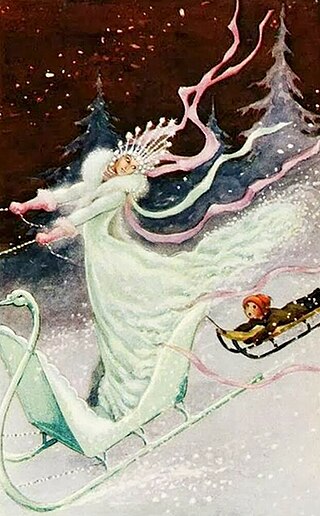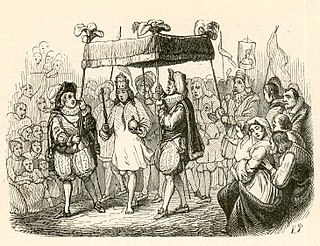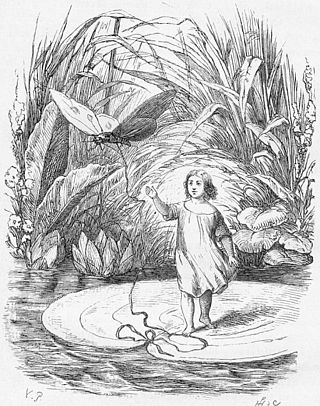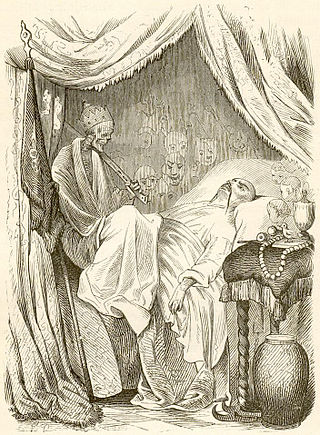
Hans Christian Andersen was a Danish author. Although a prolific writer of plays, travelogues, novels, and poems, he is best remembered for his literary fairy tales.

"The Snow Queen" is an 1844 original fairy tale by Danish author Hans Christian Andersen. It was first published 21 December 1844 in New Fairy Tales. First Volume. Second Collection. The story centers on the struggle between good and evil as experienced by Gerda and her friend, Kai. Unlike Andersen's other stories, The Snow Queen is written in a novel-styled narrative, being divided into seven chapters.

"The Emperor's New Clothes" is a literary folktale written by Danish author Hans Christian Andersen, about a vain emperor who gets exposed before his subjects. The tale has been translated into over 100 languages.

"The Ugly Duckling" is a Danish literary fairy tale by Danish poet and author Hans Christian Andersen (1805–1875). It was first published on 11 November 1843 in New Fairy Tales. First Volume. First Collection, with three other tales by Andersen in Copenhagen to great critical acclaim. The tale has been adapted to various media, including opera, musical, and animated film. The tale is an original story by Andersen.

"The Little Mermaid", sometimes translated in English as "The Little Sea Maid", is a fairy tale written by Danish author Hans Christian Andersen. Originally published in 1837 as part of a collection of fairy tales for children, the story follows the journey of a young mermaid princess who is willing to give up her life in the sea as a mermaid to gain a human soul.

"The Little Match Girl" is a literary fairy tale by Danish poet and author Hans Christian Andersen. The story, about a dying child's dreams and hope, was first published in 1845. It has been adapted to various media, including animated, live-action, and VR films as well as television musicals and opera.

"The Steadfast Tin Soldier" is a literary fairy tale by Hans Christian Andersen about a tin soldier's love for a paper ballerina. The tale was first published in Copenhagen by C.A. Reitzel on 2 October 1838 in the first booklet of Fairy Tales Told for Children. New Collection. The booklet consists of Andersen's "The Daisy" and "The Wild Swans". The tale was Andersen's first not based upon a folk tale or a literary model. "The Steadfast Tin Soldier" has been adapted to various media including ballet and animated film.

"The Shadow" is a literary fairy tale by Danish poet and author Hans Christian Andersen. The tale was first published in 1847.

Thumbelina is a literary fairy tale written by the famous Danish author Hans Christian Andersen. It was first published by C. A. Reitzel on 16 December 1835 in Copenhagen, Denmark, with "The Naughty Boy" and "The Travelling Companion" in the second installment of Fairy Tales Told for Children. Thumbelina is about a tiny girl and her adventures with marriage-minded toads, moles, and cockchafers. She successfully avoids their intentions before falling in love with a flower-fairy prince just her size.

"The Princess and the Pea" is a literary fairy tale by Hans Christian Andersen about a princess who is tested to become the wife to a lonely prince. The tale was first published with three others by Andersen in a cheap booklet on 8 May 1835 in Copenhagen by C. A. Reitzel.

"The Nightingale" is a literary fairy tale written by Danish author Hans Christian Andersen. Set in ancient China, the story recounts the friendship between the Emperor and a nightingale.

"The Swineherd" is a literary fairy tale by Hans Christian Andersen about a prince who disguises himself as a swineherd to win an arrogant princess. The tale was first published December 20, 1841 by C. A. Reitzel in Copenhagen, Denmark in Fairy Tales Told for Children. New Collection. Third Booklet. The tale appears to be original with Andersen though similar tales are known. "The Swineherd" has been adapted to other media.

"The Red Shoes" is a literary fairy tale by Danish poet and author Hans Christian Andersen first published by C.A. Reitzel in Copenhagen 7 April 1845 in New Fairy Tales. First Volume. Third Collection. Other tales in the volume include "The Elf Mound" (Elverhøi), "The Jumpers" (Springfyrene), "The Shepherdess and the Chimney Sweep", and "Holger Danske".

This is a list of published works by Hans Christian Andersen. The list has been supplemented with a few important posthumous editions of his works; the year given in each entry refers to the first Danish edition. They are all in the public domain because Andersen died over 100 years ago.

"The Garden of Paradise" is a literary fairy tale by Hans Christian Andersen first published by C. A. Reitzel in Copenhagen, Denmark on 19 October 1839 with "The Flying Trunk" and "The Storks" in Fairy Tales Told for Children. New Collection. Second Booklet. Maximilian II of Bavaria read and liked the tale. Andersen biographer Jackie Wullschlager considers the story and its two companion pieces in the booklet as "grim". "The Garden of Paradise" ends with Death approaching a young prince and warning him to expiate his sins for, one day, he will come for him and "clap him in the black coffin".

Fairy Tales Told for Children. New Collection is a collection of ten fairy tales by Hans Christian Andersen. The tales were published in a series of three installments by C. A. Reitzel in Copenhagen, Denmark between October 1838 and December 1841.
"The Tallow Candle" is a 700-word literary fairytale by Danish writer Hans Christian Andersen (1805–1875).

The Danish author Louis Jensen was an innovator in the international literary trends of flash fiction, metafiction, prose poetry, and magical realism. While he published more than 90 books for both adults and children, he was best known for his children's books, which include picture books, short stories, flash fiction, creative nonfiction and novels. His work is characterized by wordplay and playful experiments in form and structure, which have led critics to draw comparisons to Borges, Calvino, Gogol, and the poetry of the Oulipo movement. His work is also rooted in the fairy tale and folk tale tradition, and is deeply influenced by the Danish author Hans Christian Andersen.
The Wicked Prince is a fairy tale by the Danish author and fabulist Hans Christian Andersen first published in 1840. The story of a conquering prince who aspires to overthrow God and is driven mad for his grandiosity, it has been analysed for its representation of technology and as an early work of science fiction.

















